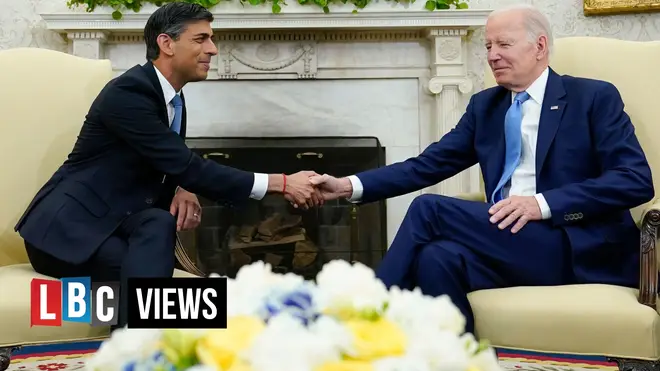
Simon Marks 3pm - 7pm
9 June 2023, 10:02

A lot has changed since Joe Biden congratulated “Rashid Sanook” on becoming the new Prime Minister of the United Kingdom last October.
While not natural bedfellows personally or politically, the two leaders have developed a closer relationship in recent months thanks to several meetings in close succession - this one, here in Washington DC, being the fourth in as many months.
It was also Sunak’s first visit to the White House - a significant moment for any British PM. But was it a success?
Well, there were clear signs of progress - and some genuinely significant announcements. The two leaders announced a new “Atlantic Declaration” that will usher in a new era of closer co-operation on vital issues of the future like AI, green energy and quantum mechanics.
The focus on increasing both countries’ economic security should help to ensure that the UK becomes more self-sufficient, resilient and therefore less vulnerable to global shocks like the pandemic or the invasion of Ukraine.
Those two events served as a wake up call for national leaders that, even in a globalised world, countries will instinctively protect their own when disaster strikes - and it doesn’t pay to be overly reliant on other states for basic needs like energy.
The new agreement will also help to break down some of the barriers to UK-US trade that were introduced in a new law at the heart of Biden’s economic agenda: the Inflation Reduction Act.
Ministers in London had expressed concerns that the US President’s focus on providing increases subsidies and benefits to US companies risked damaging UK firms.
Listen and subscribe to Unprecedented: Inside Downing Street on Global Player
The new agreements announced at the White House press conference yesterday are designed to make sure that some UK companies can also access these benefits. That is a success for Sunak.
But this is not a victory for free trade. While the deal will make trade between the UK and US easier, it could also be seen as Britain being forced to buy into what critics have called Joe Biden’s overly protectionist approach - tying the UK more closely to the US at the expense of doing as much business with other countries.
Instead of the promise of “Global Britain” trading freely across the globe, Sunak has moved the UK even more tightly under the US’s economic umbrella.
Perhaps that was inevitable: in the wake of the pandemic and the invasion of Ukraine, the world appears to be retreating into a network of distinct alliances. It is no great surprise that the shock of those two events has helped reforge the UK-US alliance. But it will come at the cost of trade elsewhere.
There is also no avoiding the fact that, while the piecemeal agreements struck this week are significant, they fall a long way short of the full UK-US trade deal that was promised by the Conservatives at the last election. Not only has that deal not materialised, but the prospect of it appears to be dead in the water.
While both leaders insisted that their new agreement was a better approach, many companies will see little benefit from the ad hoc agreements when compared to the advantages they would get from a full trade deal.
All in all, Sunak’s team is pleased with how the visit went. There has been a frosty covering over the Special Relationship in recent years, particularly under Boris Johnson’s leadership, that does now seem to be starting to thaw.
As well as the agreements struck, those in government point to the fact that Sunak was given more of Biden’s time than some of the PM’s predecessors were - around an hour and a half of meetings, plus a joint press conference and even a private tour of the White House residence - as a sign that the historic alliance is in a better place now than it was in the past.
There is some way to go, but things at least seem to be going in the right direction.